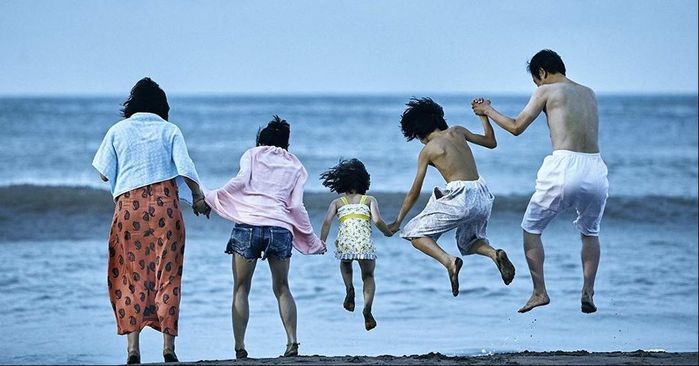SHOPLIFTERS
****
Director: Kore-eda Hirokazu
Screenwriter: Kore-eda Hirokazu
Principal cast:
Lily Franky
Ando Sakura
Matsuoka Mayu
Kiki Kilin
Jyo Kairi
Sasaki Miyu
Country: Japan
Classification: M
Runtime: 121 mins.
Australian release date: 15 November 2018
Previewed at: The Chauvel Cinema, Sydney, on 15 November 2018.
Having won the Jury Prize at the Cannes Film Festival in 2013 for his compelling film Like Father, Like Son, Hirokazu Kore-eda’s most recent feature, Shoplifters, has taken out the big one, winning the Palme d’Or at Cannes this year. Like its predecessor, the film deals with the complexity of modern domestic life in Japan and, in this case, the intriguing, unusual circumstances of what seems to be three generations of the same family living under the same roof. Kore-eda has been compared to the great Japanese director Yasujiro Ozu but he has been quoted as saying he is more influenced by the oeuvre of British director Ken Loach, and this is evident in his body of work to date.
Petty criminal and occasional worker Osamu (Lily Franky) is returning home one evening after a spot of shoplifting, accompanied by his son Shota (Jyo Kairi), when he spies a little girl, Juri (Sasaki Miyu), locked out on a balcony in the freezing cold. This is not the first time they have noticed her being neglected, so he decides to take her home to his family. There, his wife Nobuyo (Ando Sakura) notices that Juri’s arms are covered with bruises and, realising the abuse the girl is facing, she reluctantly resolves to keep her. The young girl is happy not to return home and, having adopted a new name, Lin, she settles into life with her new-found family, quickly bonding with her ‘brother’ Shota. Although impoverished, this is a family where everyone looks out for one-another. Her ‘parents’ are nurturing and non-judgmental, as exhibited by their attitude to their daughter Aki’s (Matsuoka Mayu) job in a peep show. Lin’s new home belongs to the matriarch of the family, who they refer to as Granny (Kirin Kiki), and although small and cluttered, it is warm and comfortable. Their only problem is that there is never enough money to support them all so shoplifting excursions augment their day-to-day food supplies. Granny’s pension helps, too. One day, their cash-poor but emotionally-rich lifestyle is suddenly threatened by a terrible event and we discover that all is not as it appears in the close-knit family.
As he did in 2004’s Nobody Knows and Like Father, Like Son, Kore-eda once again portrays an unconventional side of Japanese family life in another complicated and compassionate story, and broaches important issues about what it means to be ‘family’. In the film, Nobuyo raises questions to the effect of, “Does giving birth make you a mother? Can you be a mother if you can’t give birth?” Is love enough to bind a family? If it’s lacking does a familial bond still exist? Kore-eda explains, “In Japan, crimes like pension frauds and parents making their children shoplift are criticized severely. Of course, these criminals should be criticized but I am wondering why people get so angry over such minor infractions even though there are many lawbreakers out there committing far more serious crimes without condemnation. Especially after the 2011 earthquakes, I didn’t feel comfortable with people saying repeatedly that a family bond is important. So I wanted to explore it by depicting a family linked by crime.”
Considered one of the best contemporary Japanese filmmakers, Kore-eda is not a director to be ignored and his scripts are always original and compelling. They leave you thinking about the intricacy of life and wondering, what would I do, how would I act in such a situation? After all, life is not always as simple as one would like it to be, and Kore-eda consistently reminds his audience of this fact. Shoplifters is a highly rewarding, unique experience and a deserving winner of the Golden Palm; it leaves you feeling satisfied, yet unnerved, all at the same time.
